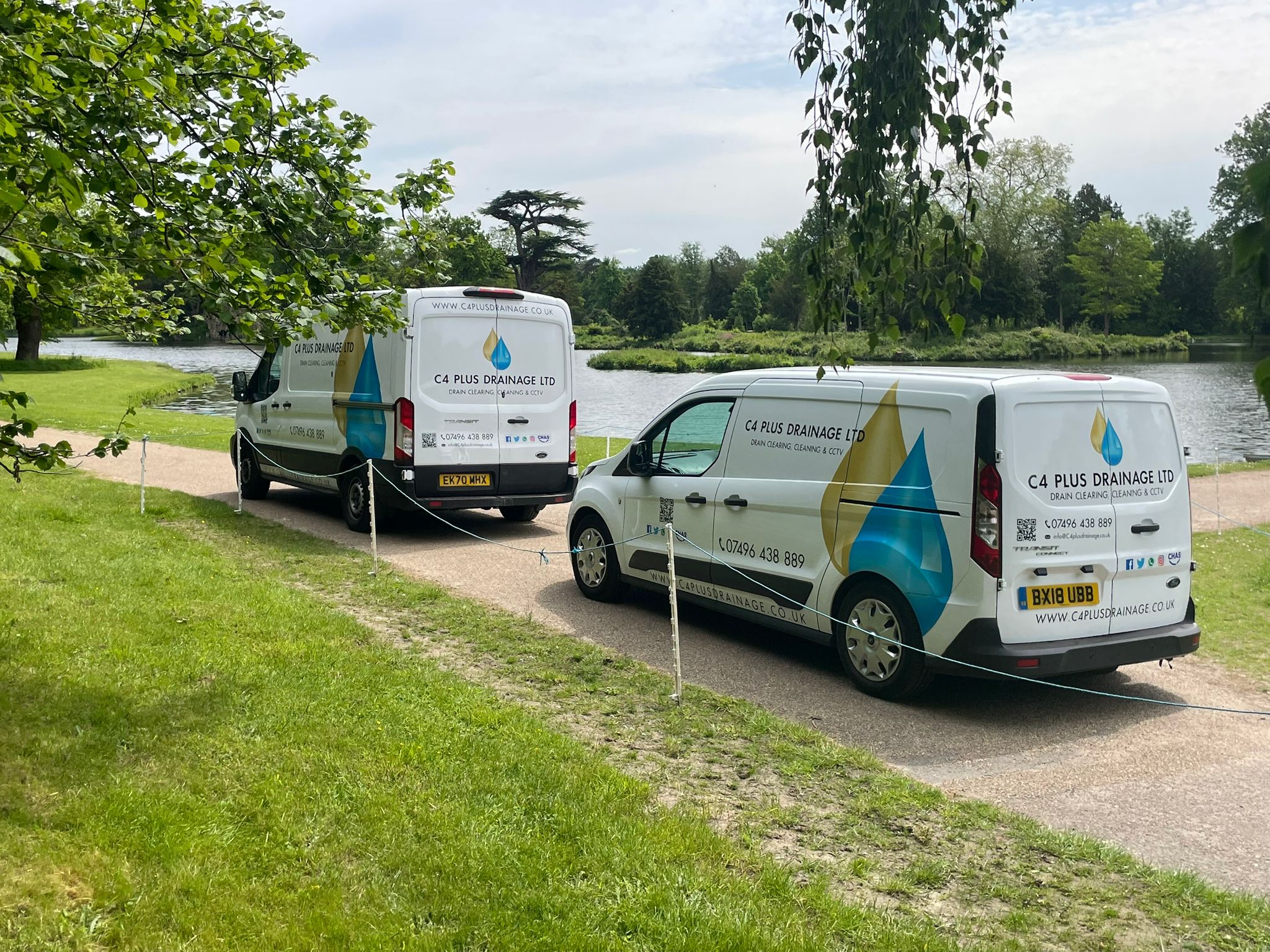Drainage Advice & FAQs – Expert Tips from C4 Plus Drainage
Frequently asked questions
- Odour and smell issues
- Rodent infestation
Domestic
- It has proven to be cost effective
- Reduces potential chance of blockages
- Reduces the likelihood of flooding and risk to health
- Financial appreciation
Commercial.
- Financial gains
- Prevention of internal external sewage flooding
- Maintenance reduces damage
- Less disturbance to business
- Reduces the emergency call outs
- Clean drains
- Reduces the likelihood of rodent infestation
The most common cause of sewer blockages is misuse, but reasons include:
Fat, Oil, Grease, and Food Waste: These substances can solidify and clog pipes over time.
Baby Wipes, Face Wipes, Sanitary Products, Cotton Buds & Hair: Non-biodegradable items that don’t break down easily.
Conventional Cleaning Products: Some chemicals can cause buildup or damage pipes.
Debris, Scale, and Silt: Accumulation of dirt and sediment in the pipes.
Rodent Infestation: Rodents can cause physical damage or blockages.
Defective Pipework: Cracked, collapsed, or poorly installed pipes.
Pipe Obstructions: Foreign objects or tree roots invading the pipes.
There are many reasons why and how a blockage accumulates. The most common causes include:
Lack of Maintenance: Neglecting regular cleaning and inspections of the drainage network.
Sewer Misuse/Abuse: Flushing or disposing of incorrect materials, such as food waste, fat, oil, grease, and wipes. Remember: Bin it, don’t flush it!
Construction Debris: Blockages often occur after property renovations or developments, where building materials or debris enter the drainage network.
Silt and Scale Buildup: Slow-draining drains and stagnant water create silt and scale compounds, typically accumulating at joint connections.
Rodent Infestation: Rats can cause severe blockages by either infesting pipes (leading to debris buildup) or causing structural damage to the pipework.
Root Penetration and Ground Movement: Tree roots can invade pipes, and ground movement can damage or misalign the drainage network.
Common signs that indicate a drainage blockage include:
Smells and Odours: Unpleasant smells coming from drains or manholes.
Toilet Water Rises When Flushed: Water backing up instead of draining properly.
Slow Draining: Water taking longer than usual to drain from sinks, showers, or baths.
Gurgling Noises: Strange noises coming from drains or pipes when water is running.
Regular Repeat Blockages: Frequent reoccurring blockages in the same area.
Every job is different. One of our technical drainage specialists will examine the extent of the blockage using our advanced CCTV equipment to pinpoint the exact cause and location of the issue.
The engineer will then update you and recommend the best solution to prevent future blockages.
All properties have different timescales and reasons for cleaning, depending on waste usage.
However, as a general guideline:
Standard Domestic Properties: Every 8–12 months.
Commercial Properties (e.g., cafes, restaurants): Every 6–8 months due to higher waste disposal.
If you have any specific queries, feel free to contact us, and one of our experts will explain in detail.
Each insurance company has different policies regarding coverage. It’s best to seek advice directly from your insurance provider or consult one of our professionals for guidance.
Do's and Dont's
- Just like your body, your drains are like the veins of your house. If they get clogged, the house won’t function properly. It’s recommended to have your drains checked every 8–12 months, or more frequently if you have recurring issues due to poorly installed pipework. A drain health check costs around £85, while major repairs can run into thousands. Remember: Prevention is better than cure!
Pasta:
Your drainpipe has a fixed width. Once pasta goes down the drain, it absorbs liquid and expands, taking up more space and causing blockages.Rice:
Like pasta, rice absorbs water and expands in your pipes. Think about how rice grows in a saucepan—now imagine that happening in your drains!Egg Shells:
Egg shells can contribute to clogs by creating a mass of material in your pipes. They’re also abrasive and can cause damage over time. Compost them—don’t flush them!- Coffee Grounds:
Plumbers often cite coffee grounds as one of the most common causes of kitchen sink clogs. Instead, use them in your garden—they’re great for roses and help produce bigger blooms! Cooking Oils and Fats:
Cooking oil hardens once it enters the drain, creating stubborn blockages. It’s messy and harmful—reuse it or bin it!Food Fat:
Butter, dairy, nuts, and other fatty foods should never go down the sink. Always bin them instead!
Baby Wipes:
A good rule of thumb: “If it doesn’t come out of you, it doesn’t belong in the loo.” Baby wipes don’t break down like toilet paper and can cause serious blockages.Floss:
Floss binds together to create a big, messy ball that can clog your pipes.Tampons:
While they technically come from you, tampons are not biodegradable and are a major cause of blockages. Contrary to popular belief, they cannot be flushed!Condoms:
Condoms are not biodegradable and can cause significant blockages in your plumbing.Nail Clippings:
These small, sharp pieces can accumulate and contribute to clogs over time.Cat Litter:
Cat litter is designed to clump and absorb moisture, making it a nightmare for your pipes.Soup or Food Stuffs:
Food waste doesn’t belong in the toilet—it can expand, decompose, and cause blockages.“Flushable” Toilet Bowl Cleaning Heads:
Despite the label, these often don’t break down properly and can clog your system.Paper Towels:
Unlike toilet paper, paper towels are designed to be durable and don’t disintegrate in water.Nappies:
Nappies are bulky and non-biodegradable, making them a major hazard for your plumbing.Makeup Remover Wipes:
These wipes don’t break down and can bind with other materials to create stubborn blockages.
Hear From Our Happy Customers!
Don’t just take our word for it—see what our happy customers have to say about their experience with C4 Plus Drainage!
Trustindex verifies that the original source of the review is Google. I contacted C4 Plus drainage recently to survey the drains at a property I am looking to buy. Ryan, on the phone, and Logan in person, gave excellent advice and service, highlighting the issues clearly in an understandable way. They provide excellent value and once the property is (hopefully) acquired I will be getting them back to carry out the remedial work needed. Highly recommended.Trustindex verifies that the original source of the review is Google. Very efficient dealing with the blocked drain which, hopefully, will solve the problem permanently. Just got on with the task, which was great.Trustindex verifies that the original source of the review is Google. Recently dropped my phone in a road side gully. Totally panicking and worried. I tried going through the proper channels of ses waters, Thames, reigate and Surrey council, only to be turned away with very little help. Found c4 plus drainage and within 10-15 mins, Paulo Jose Penedo arrived and helped me with my issue very quickly. Thank you very much Paulo again!Trustindex verifies that the original source of the review is Google. Fantastic service. Arrived within 90 minutes. Courtney was very thorough and professional. Did a fantastic job. Would definitely recommend this companyTrustindex verifies that the original source of the review is Google. Once again C4 came to the rescue. We used them a year ago to clear the drains at a previous property and having moved to a new one discovered the drains there to be blocked too - despite being empty for a year! The engineer, Courtney, was very amiable and polite and explained that waste from other houses in the run had backed up and basically set because there was no water running from my property to wash it back down. He power jetted the run and I could see that it was free flowing as it should be. A job well done. Thank you again Ryan for arranging this.Trustindex verifies that the original source of the review is Google. The previous owners of my house had thought it a good idea to bury a manhole cover under a raised flower bed. The manhole collapsed into the sewer, causing a horrible mess. I phoned C4 simply because one of their vans was parked round the corner from my house. They came out following day, Antonio worked really hard and resolved the enmergency. A couple of C4 men came a few days later to rebuild and raise the manhole. They did a very neat job. Happy to recommend C4 plus drainage!Trustindex verifies that the original source of the review is Google. Logan came and cleared our blocked drain within 15 minutes, and did an excellent job. He also explained what he needed to do to get the job done, we now a free running drain thanks to you and your team.Trustindex verifies that the original source of the review is Google. Logan was very professional and thorough in his approach and did the job with the right set of tools and devices. The job got finished within 30 minutes and cleared the blocked kitchen sink and there was no more spillage from the overflow pipe. Highly recommended .Trustindex verifies that the original source of the review is Google. Fantastic service. Arrived within 90 minutes of calling. Courtney was thorough and professional. Brilliant service - thanks so much.
24HR Drain Clearance
Blocked Drain? Unable to flush your Toilet? Bad Smell or Odour? Call us 24 hours a day, 7 days a week and one of our friendly Technical Specialists will resolve your issue Fast, Efficiently and Effectively.
Full Service List
Jetting, clearing, cleaning, CCTV investigation, blockages, flooding, blocked drains, infestations, collapsed drains, de-scaling and lining, internal blockages, external blockage, sewer cleaning and health and safety reviews.
Local to you
C4 Drainage and sewer repairs are based in Caterham but service Coulsdon, Warlingham, Purley, Kenley, Croydon, Woldingham and surrounding areas. We can be with you within the hour, 24 hours a day 7 days a week, 365 days a year.




